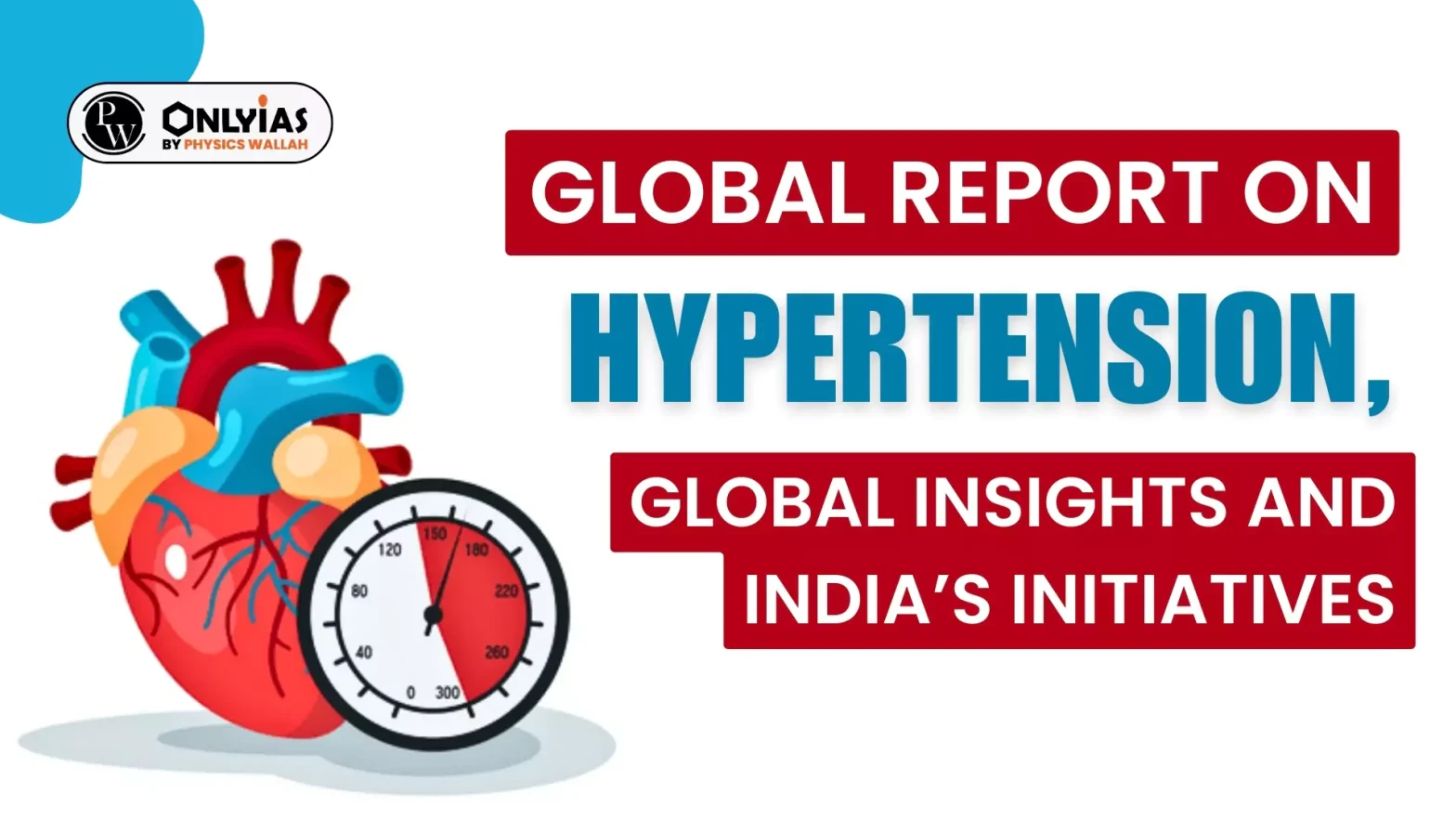Context
Recently, the World Health Organization (WHO) released a report, the first ever on hypertension, titled “Global report on hypertension: the race against a silent killer”.
Key Findings of the Global Report on Hypertension
- Global Deaths due to Hypertension: Hypertension was considered a silent killer as people often are not aware about high blood pressure till they develop complications.
- High blood pressure is the single most important risk factor for early deaths, leading to an estimated 10.8 million preventable deaths every year, globally.
- Data on Hypertension: The number of adults with hypertension nearly doubled in the last three decades (since 1990) to reach 1.3 billion.
- Global Hypertension Awareness: Globally, an estimated 46% of adults with hypertension are unaware of their condition, and less than half (42%) are diagnosed and treated. Only 21% of adults with hypertension have it under control.
- Hypertension Prevalence in India:The Indian Council of Medical Research-INdia DIABetes (ICMR-INDIAB) study has estimated that in India, 311 million people (or one in every three adults) have hypertension.
- In the country, adults with hypertension are threefold of the estimated 101 million people living with diabetes.
Enroll now for UPSC Online Course
Strategies and Initiatives to Address Hypertension
- Reduction in Salt intake: Excess salt intake, a key risk factor for hypertension, contributes to cardiovascular disease deaths. Reduction in salt intake can substantially decrease cardiovascular disease risks and mortality rates.
- Research studies have shown that by reducing salt, cardiovascular disease risks can be reduced by 30% and mortality by 20%.
- Indian adults consume on average eight to 11 grams of salt per day, which is approximately twice that of the WHO recommended daily salt intake.
- High salt intake is responsible for an estimated 1,75,000 deaths in India.
- Public Health Initiative in India: India aims to provide standard care for 75 million individuals with hypertension and/or diabetes by 2025.
- The India Hypertension Control Initiative (IHCI), launched in November 2017 across 25 districts in five Indian states, is a collaborative effort involving the ICMR, Ministry of Health and Family Welfare/Directorate General of Health Services, WHO India, and other partners.”
- Strategies Followed by IHCI: The IHCI rolled out simplified drug and dose-specific treatment protocols for primary-care settings.
- The IHCI strengthened the drug supply chain by adding protocol-based drugs to the State essential drug list and forecasting drug needs based on morbidity.
- It ensured sufficient budget allocation for purchasing hypertension medication in annual plans.
- The initiative promoted team-based, decentralized care and patient-centric health services, such as providing 30 days of medicine during each patient visit. Information systems were utilized for program monitoring.
Learnings from IHCI strategy
- Enhancing Health Service Access: The development of simple treatment protocols with fewer drugs, ensuring reliable drug supply, linking patients to facilities closer to home for follow-up and engaging teams increases access and utilization of health services from government facilities, by bringing people to health services
- Streamlined Monitoring: Simplified programme monitoring makes programme performance assessment both quantifiable and actionable
- Nationwide Expansion of IHCI: The IHCI was expanded to 140-plus districts of India, in 2023.
Way Forward
- Controlling Hypertension: Seventy-six million cardiovascular deaths and 450 million disability adjusted life years (DALYs) would be avoided, if countries, with proven interventions, mobilise to achieve the goal of 50% population hypertension control by 2050.
- Controlling Blood Pressure: An estimated 4.6 million deaths can be prevented in India by 2040 if half the hypertensive population has its blood pressure under control.
- This will help countries achieve the targets under their National Health Policy along with global targets and commitments such as universal health coverage.
- Raising Awareness: Raise awareness about the risk of and long-term adverse impact of untreated hypertension. High blood pressure can affect the entire vascular system (multiple organs including the heart, kidneys, brain and eyes).
- Expanding IHCI Model for Prevention: Scale up evidence-based public health interventions such as the IHCI.
- Strategies and lessons from such experiences should be used to design and implement interventions to prevent and control other lifestyle diseases such as diabetes mellitus and chronic kidney diseases.
- Targeting Risk Factors:Efforts must target non-modifiable risk factors such as family history and age, alongside modifiable factors like salt consumption.
- Focusing on Strategies to reduce salt: Intensify efforts to reduce dietary salt consumption using strategies such as ‘SHAKE the salt habit’ under the WHO’s HEARTS strategy. Under SHAKE, there are five approaches:
- Surveillance measures and monitor salt use;
- Harness industry to promote and reformulate foods and meals that contain less salt;
- Adopt to standard labeling and marketing;
- Knowledge, educate and communicate to empower individuals to eat less salt;
- Environment — support settings that promote healthy eating.
- Multi Sectoral Approach: Lifestyle diseases demand multi-sectoral actions. In 2017, India developed and approved a multi-sectoral plan for the prevention and the control of non-communicable diseases.
- These plans must be revisited and more concrete actions done by key sectors.
- Public Awareness and Education: Educating the public about the risks of hypertension and the importance of salt reduction is crucial.
- Enhanced food regulation enforcement and taxation on high-salt products can mitigate disease burden.
- Strengthening Food Regulation in India: Stronger enforcement of food regulation in India has the potential to prevent many diseases and reduce the burden on health services. There needs to be higher taxation on high salt (and also high sugar, high fat) food and other packaged products.
- Regular Blood Pressure Monitoring: Incorporating routine blood pressure checks into daily life and workplace environments is essential. Access to blood pressure monitoring devices should be expanded in public spaces and workplaces.
Enroll now for UPSC Online Classes
Conclusion
Hypertension presents a major public health challenge worldwide and in India, leading to preventable deaths and illness. Effective control requires comprehensive strategies, including salt reduction, public awareness, and multi-sectoral collaboration.
![]() 17 May 2024
17 May 2024

